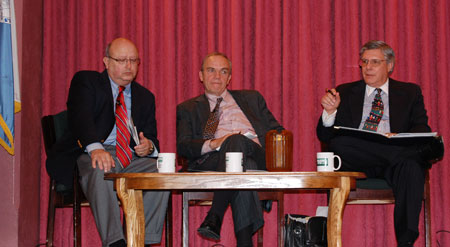Earmarks, independence and interagency politics were among the subjects discussed this week at an unprecedented gathering of former federal leaders on juvenile justice.
Six of the eight former administrators of the Office of Juvenile Justice and Delinquency Prevention led OJJDP@35, a panel discussion hosted by Youth Today:The Newspaper on Youth Work, speaking to an audience of advocates, foundation leaders, political staff and executives of national programs that serve juvenile offenders.
Many involved in national juvenile justice issues know of Shay Bilchik, who ran OJJDP during the Clinton era, and Ira Schwartz, who ran the office for former president Jimmy Carter. Both have remained in the youth work field: Bilchik was CEO of the Child Welfare League of America and now heads the Center for Juvenile Justice Reform at Georgetown University in Washington, D.C., and Schwartz is now CEO of Jewish Federation of Greater Philadelphia after serving as provost for Temple University in Philadelphia. (He is also board chair of Youth Today’s parent organization, the American Youth Work Center.)

But few of the 150 people in attendance were familiar with the experiences of Reagan appointees Al Regnery and Verne Speirs, George H.W. Bush appointee Bob Sweet, or Carter’s first administrator, John Rector. And many of the administrators had barely interacted with each other before the event.
“It was a bridge between generations,” said Liz Ryan, CEO of the Campaign for Youth Justice, one of several organizations pushing for reauthorization of the Juvenile Justice and Delinquency Prevention Act. “I was not [in Washington, D.C.] in the pre-Shay era, so I didn’t have any insight about it. These are senior experts who have been around the block, it was great to hear what they had to say.”
Rector, the first Carter-era administrator, spoke of early efforts to keep OJJDP funding discreet from the other accounts of its parent agency at the time, the Law Enforcement Assistance Administration (LEAA), now known as the Office of Justice Programs.
Rector had helped craft the Juvenile Justice and Delinquency Prevention Act of 1974, the piece of legislation that created OJJDP, when he worked for former Sen. Birch Bayh (D-Ind.). The act envisioned a federal agency that would promote “advocacy, change, reform and allocating money.”
He said he was “shocked” at how quickly LEAA’s other priorities had permeated the OJJDP accounts.
“LEAA was bragging about how much money they were spending on juvenile justice,” Rector told the group, “but the people I worked for wanted that money spent differently.”
His mission was to “make the reality of the act” become “the reality of the office,” Rector said. A major part of that was to take the discretionary money, then given out to state planning boards, and put it up for competition in the Federal Register.
Schwartz said the crowning achievement of his tenure was the amendment to the act that mandated the removal of children from adult jails, which OJJDP assisted advocates in developing and eventually selling to Congress.
“I got goosebumps,” Schwartz recalled, about “how proud I was of the U.S. Department of Justice that day.”
The next three administrators – Regnery, Speirs and Sweet – would work for administrations that sought either to zero out OJJDP, or slash its budget to a laughable sum.
“I wanted to serve the president,” recalled Regnery, who had never heard of OJJDP before being asked to run it for president Reagan. “There was a lot of money to give away. And I always liked a challenge.”
Neither Rengery nor Sweet had worked in juvenile justice before their appointments. Sweet, who ran the office from 1990 to 1992 for president George H.W. Bush, may not have been confirmed without some last-minute support from former Boys & Girls Clubs of America lobbyist Robbie Callaway.
“I didn’t know how to solve all the juvenile justice problems in America,” Sweet said. “That’s what [then-Senate Judiciary Committee chair] Joe Biden asked me.”
Sweet said he faced significant pressure from his superiors at the Justice Department when it came to grant-making. “Weed and Seed was the big priority” at Justice then, Sweet said. “Nobody knew what it was, but we all contributed.”
Not so under Reagan, according to Regnery. “I didn’t really have to answer to anybody. I could say what I wanted, and had nobody to clear it with.” Also, Regnery said, “I had more money to give away than some cabinet members.”
To a man, the former administrators in attendance agreed that earmarks had a serious impact on the standing of OJJDP in the juvenile justice community. Earlier administrators recalled pressure from all kinds of politicians to give out grants – “I got to know the governor’s voice from Louisiana [Democrat Edwin Edwards, now in federal prison for racketeering] as if he was a neighbor,” Rector quipped – but said that today’s form of earmarking was not yet in existence.
“How many of you oppose earmarks?” asked moderator Patrick Boyle, Youth Today’s editor. All six men raised their hands.
“Earmarks gave away [OJJDP’s] ability to do things,” said Schwartz. “The new administrator is coming in cash-strapped.”
The administrators at the bookends of OJJDP history were the only two not in attendance at OJJDP@35. Milton Luger, who oversaw the office for former president Gerald Ford, died in 2001. J. Robert Flores, who was administrator for almost all of former president George W. Bush’s tenure, did not respond to invitations to attend the event.
OJJDP’s current acting administrator, Jeff Slowikowski, was in attendance at the forum, as was Laurie Robinson, who was sworn in this week to be assistant attorney general for justice programs. The OJJDP administrator and four other presidential nominees answer to Robinson.
A nomination for OJJDP is expected to come quickly now that Robinson has been sworn in.
In the following days, selected video clips of the event – focusing on comments by the former administrators – will be posted on www. youthtoday.org.






























